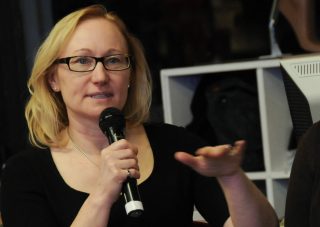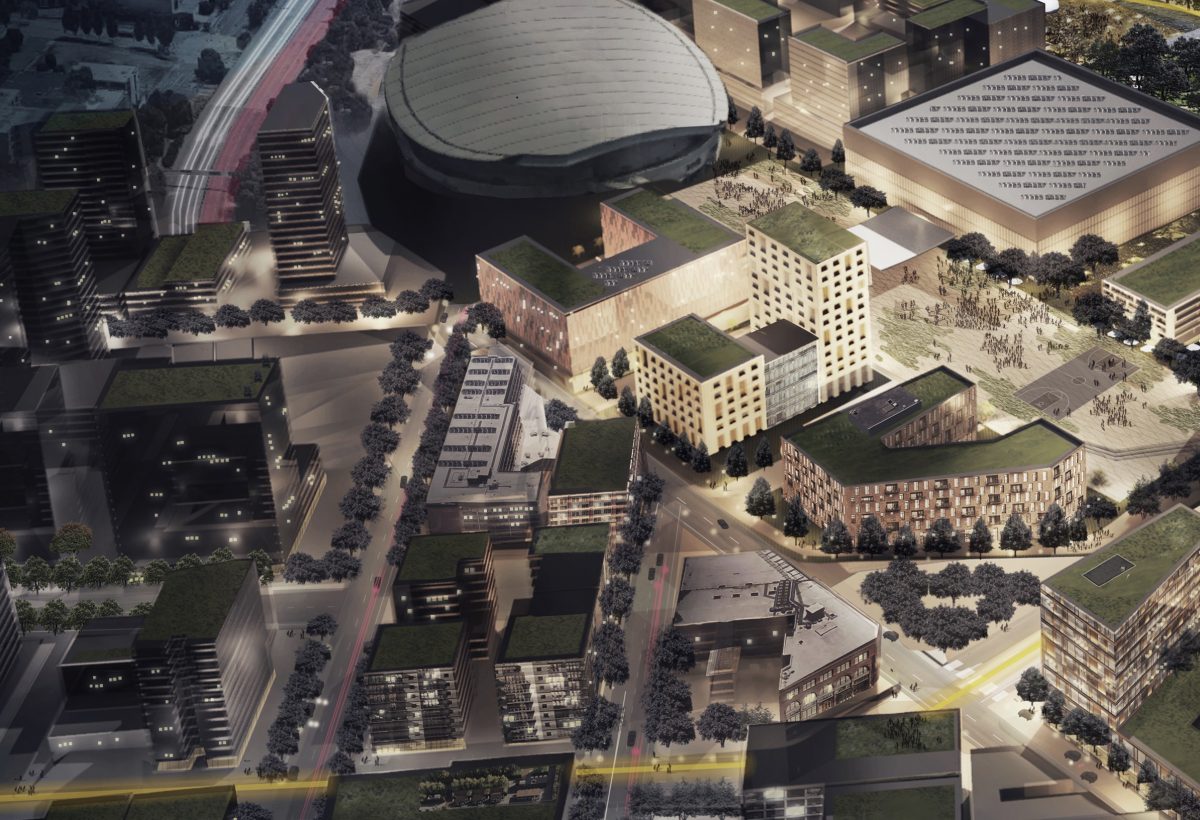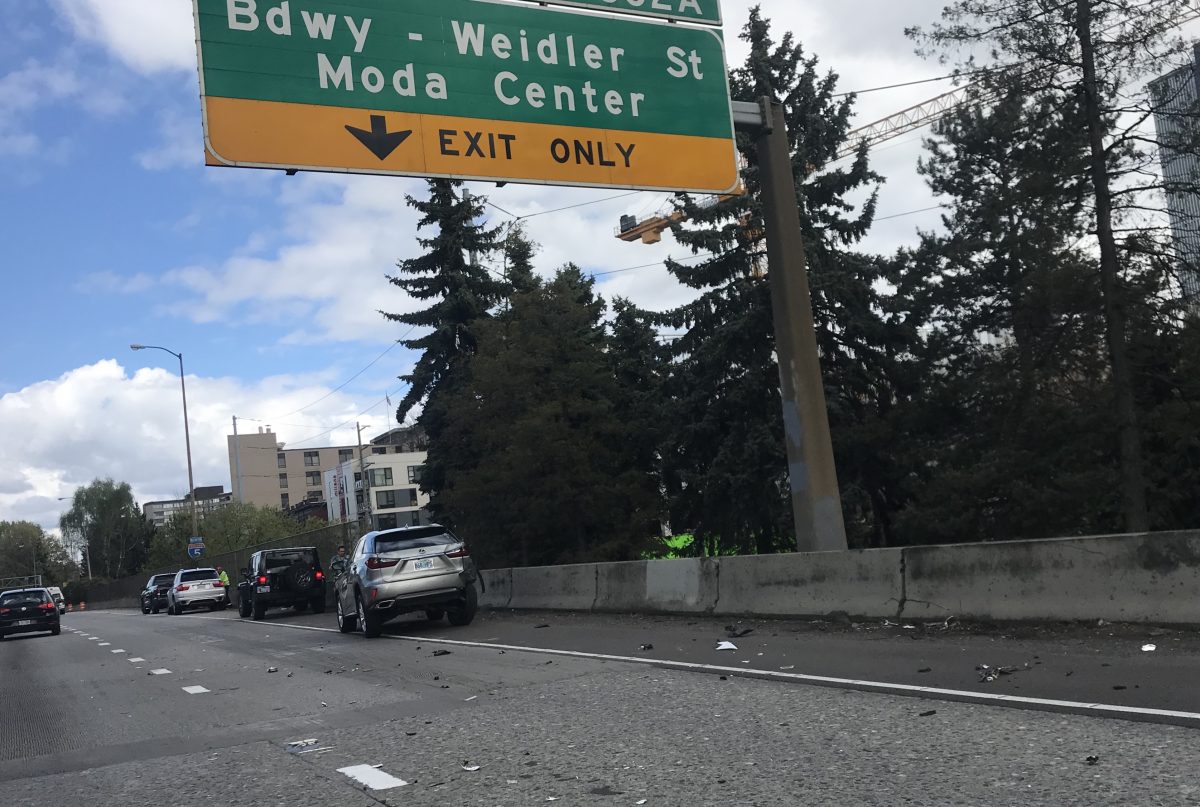
Metro President Lynn Peterson and Portland Mayor Ted Wheeler have found a politically convenient way out of the predicament posed by the very unpopular I-5 Rose Quarter Project: the Albina Vision plan. Drowning in a sea of controversy around the idea of expanding a freeway through our central city, both leaders have made this plan central to their position on the project.
“One of the biggest opportunities in our region is the Albina Vision plan.”
— Lynn Peterson, Metro President
These key leaders support the project, much to the chagrin of the broad base of opposition that emerged in recent months. The $500 million project seeks to redesign surface streets in the Rose Quarter and add new lanes and shoulders to I-5 between I-84 and the Fremont Bridge
Wheeler and Peterson see it as a relatively minor (technically speaking), necessary project and they trust the Oregon Department of Transportation (ODOT) — an agency that claims adding lanes and shoulders to I-5 will reduce crashes and decrease congestion, while having no major impact on air quality or greenhouse gas emissions — to see it through.
As the community’s distrust and doubts about ODOT rose during a recent comment period on the project, so did pressure on Peterson and Wheeler. In the past month, both leaders have tried to clarify where they stand.

(Photo: J. Maus/BikePortland)
Peterson spoke about the project at her recent State of the Region address and in an interview on KATU-TV (Portland’s ABC affiliate). She and Wheeler also wrote a joint letter to Oregon Transportation Commissioner Chair Tammy Baney on April 5th that outlined their views and concerns.
In her recent public appearances, Petersen has sent mixed signals. On one hand she said she wants to “keep moving on” with the project; but she also acknowledged that the Oregon Department of Transportation (ODOT) has not adequately accounted for the project’s environmental impacts. (Keep in mind that Metro, the agency Peterson oversees, has accused ODOT of willful obfuscation about the project’s impacts and has called for a more thorough environmental review.)
Then there’s Peterson’s full embrace of the Albina Vision plan, which she sees as inextricably linked to the freeway expansion.
When it comes to transportation, Peterson is expected to bring a more progressive and reform-minded view to the table than her predecessor (a former mayor of suburban Hillsboro). Activists are watching her closely as she steers the 2020 Transportation Investment Bond toward the ballot. That’s why local transportation insiders watched her State of the Region speech on April 19th so closely.
“For decades we’ve questioned the ways we approached growth and change… we pioneered light rail instead of building another freeway.”
— Lynn Peterson
In that speech, Peterson touted Portland’s “visionary” legacy. “For decades we’ve questioned the ways we approached growth and change,” she said. “When we needed to figure out how to move more people from the eastside into downtown Portland, we pioneered light rail instead of building another freeway.”
Peterson, who told the crowd that she drove to the event, bemoaned congestion and the unsafe road conditions caused by too much driving. She talked about the “rebirth of downtowns” with safe places to bike and the need to, “create corridors that connect and rebuild our communities into healthy, walkable communities that support small businesses.”
Advertisement
When Peterson directly addressed the I-5 Rose Quarter project she said the freeway is, “Oregon’s connection to the world,” and businesses all over the state rely on it to get their goods to market. “Our legislature has stepped up to support improvements to our freeway system,” she said. “But we have to be smart about how that system interacts with our own communities.”
Then she made a notable pivot: “That’s why one of the biggest opportunities in our region is the Albina Vision plan.”

(Graphic: Hennebery Eddy Architects)
The Albina Vision plan is in its infancy and at this point is nothing more than a few conceptual renderings, but that hasn’t stopped Peterson and Wheeler from grabbing hold of it.
In a Q & A portion of the State of the Region event, Peterson was asked by former Portland mayoral candidate Sarah Iannarone if she could envision a revitalized Albina neighborhood without the I-5 project. “In what ways can Metro leverage its regional coordinating function to help us see a bold future in Lower Albina that doesn’t include freeway expansion, especially when you think about our climate action goals and goals to reduce greenhouse gas emissions in a very short time frame?” Iannarone asked.
Peterson replied by touting the project and saying she supports the I-5 project for two main reasons: The freeway lids and a need to alleviate a “chokepoint.”
The lids, “Will be able to allow for that connective tissue of urban-ness so that you never feel like your’e walking across a freeway,” Peterson said. “[The lids] aren’t going to happen if we’re not also doing the other part of the project.” As for the “other part,” Peterson feels like the addition of 3.2 miles of new lanes and shoulders (what economist Joe Cortright calls “hidden mega-freeway”), “Is actually a small tweak to a freeway system.”

(Photo: J. Maus/BikePortland)
Peterson said the new lanes on I-5 are necessary to prevent “little fender-benders” that cause traffic back-ups. “If we’re going to put predictability back into the system we have to do some small tweaks. Some of these small tweaks are pretty dang expensive because they’re in the middle of the urban area. But they’re worth it. They’re worth it for the long run and I think we need to keep moving on.”
Peterson echoed this stance a few days later in an interview on KATU’s Your Voice, Your Vote program where she once again said her main justification for the I-5 project was that it would spur the Albina Vision plan.
“I think it’s refreshing that leaders are listening… We applaud their willingness to speak up.”
— Rukaiyah Adams, Albina Vision
“The more important aspect of the project though [beyond addressing congestion], is that it will allow for the Albina Vision to be realized,” Peterson offered. And again she mentioned that she sees the freeway lids as the lynchpin to that vision. “How do we use that [freeway lids] to reinvigorate, economically, physically, to spur all this development in the Rose Quarter?”
As we reported on March 29th, according to Albina Vision leader Rukaiyah Adams, the main problem with ODOT’s current lid design is they’re slated to be nothing more than empty spaces. “There is no need for small, unused spaces on top of l-5,” Adams said in a letter to ODOT and the Federal Highway Administration.
Compare that to the April 5th letter from Mayor Wheeler and President Peterson: “ODOT, through the freeway caps, has an opportunity to provide open space in an area that sorely needs more public space.”
Asked by KATU if it’s time to go back and start the project over, Peterson said she wants ODOT to do more analysis of community impacts and that we need to, “Get to an outcome where we have a design that the community designed, not that ODOT designed.”
That “community” will include Rukaiyah Adams, leader of Albina Vision Trust. I asked her what she thought of Peterson’s recent comments and the embrace of her project by Metro’s President and Portland’s Mayor.
“I think it’s refreshing that leaders are listening,” she shared with BikePortland. “What started out as a discussion about an interstate improvement project has expanded into a thoughtful exchange of ideas about how a modern transportation system can help us realize a better community.”
“And, in this case,” Adams continued, “that discussion is squarely reckoning with the destruction of the historic African-American community in Portland. If having civic leaders talk about that openly is jarring, it should be. It was intentional and staggering in its audacity. So too must be the way that we talk about it and remediate it.”
Wheeler’s budget released today includes $70,000 to further develop the Albina Vision. Peterson says she’s setting up a meeting with Adams, OTC Chair Tammy Baney, ODOT, and the City of Portland. I wish them well. It’ll take plenty of audacity to find a way forward that the community is comfortable with.
— Jonathan Maus: (503) 706-8804, @jonathan_maus on Twitter and jonathan@bikeportland.org
Never miss a story. Sign-up for the daily BP Headlines email.
BikePortland needs your support.

